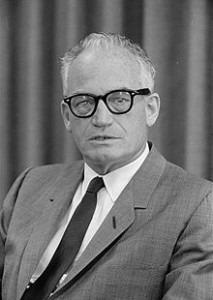4 November 2016 – The historian Richard Hofstadter wrote a still widely read 1964 essay for Harper’s Magazine outlining what he called the “paranoid style” in American politics. Marked by “a sense of heated exaggeration”, suspicion, and wild fears of political conspiracy, it was, he argued, a common part of American political life. It dated back to the rise of the antislavery movement before the Civil War, and every so often, it resurfaced at times of national crisis. I used it for my recent essay “Donald Trump, media politics and the business of outrage“.
Hofstadter was alarmed to see this way of thinking infuse the politics of his own time. One example was the “Red Scare”, a series of anti-communist investigations and purges led by Senator Joe McCarthy.
And then there was Barry Goldwater, the Republican party’s 1964 presidential nominee.
Goldwater, a senator from Arizona, was an outsider in the Republican party, known for his staunch anti-communism and opposition to the Civil Rights Act. He surprised everybody by beating the better-known and more moderate Nelson Rockefeller to become the party’s choice for president.
Barry Goldwater
Goldwater picked up support from conservative voters who feared their role in society was under threat – that the fast-changing US was being taken away from them and their kind. “Traditional American values” were being undermined by left-wing intellectuals; the country was in danger, under threat from communist aggression abroad and Soviet spies and sympathizers at home.
Mainstream political leaders didn’t understand these fears, or simply chose to ignore them. But Goldwater did understand, and he won over grassroots activists by speaking directly to their concerns.
At home, he promised to reduce government spending and cut welfare payments. Abroad, he was committed to militant anti-Communism, including the use of battlefield nuclear weapons. He summed up his views at the Republican party convention in 1964: “
I would remind you that extremism in the defence of liberty is no vice. And let me remind you also that moderation in the pursuit of justice is no virtue.
Goldwater was admired by Republican activists, but the wider electorate considered him beyond the pale. In the November election, he was crushed by the incumbent Democratic president, Lyndon Johnson. Nonetheless, Goldwater’s campaign fundamentally changed the thinking of his party – and five decades on, the conditions that led to the rise of Goldwater are on full display once again.
In his 1964 essay, Hofstadter argued that the paranoid style tends to resurface when class, ethnic and religious conflicts come to the fore. All three are roiling the US today.
Today, the gap between the political elite and middle- and working-class Americans is as wide as it’s ever been. The uncertainty that set in after the economic crisis of 2008 endures; it has left workers deeply anxious about jobs and wages – and they fear labor competition from immigrants, especially Mexican ones. Internationally, the rise of radical Islam has threatened American interests abroad – and a series of “home-grown” extremist terror attacks (here, here and here) have only reinforced the image of a nation under threat.
As Hofstadter put it, the paranoid style of mind creates “heroic strivings for evidence to prove that the unbelievable is the only thing that can be believed”. Sure enough, many of Trump’s supporters apparently see their candidate as a knight in shining armor who can do no wrong. From this standpoint, attacks on his campaign aren’t grounded in reality or motivated purely by political differences; they are the work of a political conspiracy.
As I said my essay (linked above) while Trump may seem like an anomaly, his campaign is in fact a constellation of familiar themes pulled together at a particularly fraught moment in US history. And candidates like this have won before.
Ben Howe is the director of a new movie “The Sociopath”. He is a member of my “media posse” and Creative Director at his Ben Howe Creative which is a full-service video content creation company specializing in political, documentary, and corporate productions. He is also the Senior Contributing Editor & Digital Content Editor at the blog Red State which provides Conservative commentary and analysis of current events with an emphasis on judicial opinions.
In his promotion of the video he notes Trump “has been called an impostor, a fraud, a fake. A charlatan. His own ghostwriter for the book “The Art of the Deal” called him a sociopath. There are many words that describe Donald Trump, and there are just as many words that don’t describe him: Conservative. Decent. Serious. Presidential.”
Whether you are liberal or conservative I recommend you watch it. It runs about 55 minutes:

